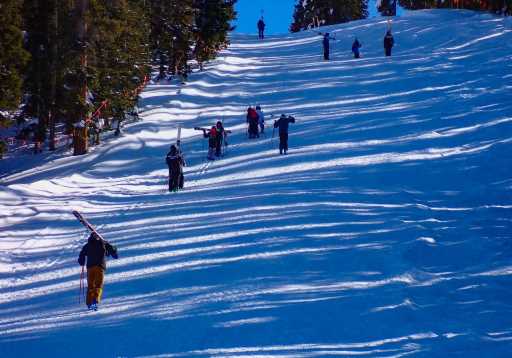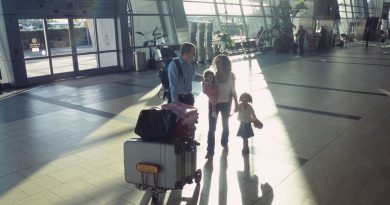Vail Resorts complaints increasing amid staffing shortages, Epic Pass terrain
CRESTED BUTTE — Several Vail Resorts properties across the country are facing backlash from skiers and snowboarders, many of them longtime customers. The problem hasn’t been a lack of snow. While it came late this season, two huge December storms dumped 90 inches on Crested Butte alone. Streets here are lined with massive snowbanks, and nearly all of the mountain’s ski terrain has been open.
But the lifts to reach all that terrain? Vail Resorts has struggled to keep those operating amid a staffing problem the company blames on the omicron variant even as its labor practices at resorts around the country have come under fire.
After several major acquisitions in recent years, including Crested Butte in 2018, Broomfield-based Vail Resorts is now the largest ski area operator in the United States with more than 30 properties in Colorado, California, Pennsylvania, New York, Vermont and beyond.
While ski areas across the country — and mountain towns in particular — have struggled with staffing this year amid omicron, high housing costs and a national labor shortage, Vail Resorts has faced a cacophony of complaints on social media and in national news stories from outlets such as the Wall Street Journal, alleging everything from long lift lines to unplowed parking lots, limited terrain and frustrated, overworked employees.
“The first two things they need to do is pay their people and house their people,” said Denis Hall, 72, who has had Crested Butte season passes for 54 years. “I gave them three years, and they didn’t make my skiing better; they made my skiing worse. I’ve been here through four different owners of the ski area, and this is the first one that has actively destroyed the ski culture that had been here through all those owners for all those years. They’ve made the place a lot worse.”
An anti-Vail Resorts online petition started by a local resident has garnered more than 400 supporters. That petition was inspired by another that was created by former Crested Butte resident Jeremy Rubingh, which blasted Vail Resorts for the way it is managing the Stevens Pass ski area in Washington State. Rubingh expected perhaps “a couple of hundred people” would respond, but his petition has been supported by nearly 44,000 people since it was posted Dec. 28, sparking anti-Vail Resorts complaints from coast to coast.
Many of those comments have come from Colorado, where Vail Resorts owns Vail, Beaver Creek, Breckenridge, Keystone and Crested Butte. The most common complaints: limited terrain offerings over the Christmas holidays and other problems caused by staffing shortages.
Will Alisberg, who had driven to Crested Butte from New York City with his girlfriend, was “overjoyed” Tuesday when the resort opened its High Lift to the top of the mountain for the first time this season. That T-bar lift serves some of the steepest terrain on the mountain, but opening lifts and keeping them open has been a challenge for mountain managers there due to staffing shortages.
When it finally opened Tuesday, it was the seventh day of Alisberg’s ski vacation.
“There are all sorts of fun runs up there,” Alisberg said. “Given that it hadn’t opened until now, a lot of the terrain was really untouched, and that was some of the best powder on the mountain.”
But on Wednesday, that lift was closed again. The terrain it accesses remained open, but skiers had to hike to get there.
At Vail Mountain, skiers and snowboarders found only about 60% of the terrain open over the Christmas holidays. That mountain’s chief operating officer, Beth Howard, blamed early season weather and staff shortages caused by COVID-19.
In Washington State, attorney general Bob Ferguson weighed in on the Vail Resorts complaints last week, tweeting that his office had received more than 80 comments about Stevens Pass over the past two months.
“This is a significant number of complaints in a short period of time,” Ferguson tweeted. “If you have been impacted, or have information, I’m asking that you file a complaint with my office.”
Only about 40% of Stevens Pass was open over the holidays, Rubingh said. Rubingh has lived in Seattle for 2½ years, but he was born and raised in Colorado, and he spent most of his adult life in Crested Butte.
“Living in Crested Butte, I watched Vail Resorts come in,” Rubingh said. “Initially there was some optimism. It was like, ‘OK, this is an established company that knows how to do skiing. They know how to do infrastructure, maybe they can start paying people better, maybe things will run more efficiently.’ Instead, what happened was the exact opposite.”
Vail Resorts’ five Colorado areas currently are reporting that 90% or more of their terrain is open. Chief executive Kirsten Lynch, who is in her first winter at the helm of the company, announced two weeks ago that employees will receive a bonus of $2 per hour for all hours worked from Jan. 1 until the end of the ski season. They must stick it out to the end to receive their bonuses, which will be paid in May. The company also says it increased the minimum wage it pays at Colorado resorts this season from $12.25 to $15 per hour.
Meanwhile, news stories about Vail’s labor practices are adding increased scrutiny. Earlier this season, ski patrol at Vail-run slopes in Park City, Utah nearly went on strike — citing too-low pay as the dominant factor, according to reporting in the Salt Lake Tribune — before reaching a tentative agreement in mid-January.
In California, Vail has extended a $13.1 million offer to settle five wage and labor lawsuits alleging that the company violated state and federal labor laws by failing to pay reimbursements for equipment and not compensating staff for time spent training, in meetings or gearing up before shifts on the mountain. The California suit is similar to a class-action lawsuit filed in Colorado District Court back in Dec. of 2020, and could spell trouble for Vail Resorts in the form of payouts for about 100,000 employees nationwide, according to reporting from Vail Daily.
But Vail’s CEO says the pandemic, not its labor practices, is to blame.
“We want nothing more than to provide each of our guests with an incredible experience at our resorts,” Lynch said in a statement to The Denver Post. “The reality is, we are still operating during a pandemic — facing a global staffing shortage and the very real impacts of omicron on our workforce, with daily COVID-19 cases in Colorado going up ninefold in the three-week period over the Christmas and New Year holidays. We take very seriously the feedback from any disappointed guest and want them to know that we are always listening; that we are very aware of, and sincerely apologize for, the challenges this season; and that we are working to constantly improve. However, it is also important to recognize that we have provided millions of positive experiences already this season — something we know from our own guest feedback and research.”
Vail has had other challenges to manage in recent days, as well. In New Hampshire, a chair detached from its lift cable and fell to the ground at Wildcat Mountain, resulting in serious rib injuries for a man who was riding the lift. In Vermont, that state’s Department of Financial Regulation filed a cease-and-desist order alleging that Vail Resorts is reneging on an agreement with about 30 immigrant investors that could lead to their deportation. Spokesman Quinn Kelsey said the company is “confident our practices are fully compliant.”
Last week, The Denver Post invited online comments from skiers and snowboarders, asking how they rate their experiences with Vail Resorts. More than 250 people responded, most of them with complaints.
Many complaints came from outside Colorado, and most had the same complaints that Rubingh and his petition respondents have raised: limited terrain offerings, staff shortages that impact resort operations, and a widespread perception that Vail Resorts needs to pay its workers more.
“People are angry and employees are angry,” wrote John Tomlinson of Parker, who typically skis at Breckenridge, Vail and Beaver Creek. “I have seen more Vail Resorts employee meltdowns this year than any other year. Nothing is about the customer. People make sacrifices to live in expensive areas like San Francisco and New York because they can find value and fulfillment in their jobs and lifestyle. Vail Resorts is struggling to offer this to their employees, and this breach in culture and values has a ripple effect that impacts the customer experience.”
Eric Moxham of Park City, Utah, cited “gross mismanagement” at Park City Mountain Resort with “complete disregard” for the experience of PCMR guests.
“Great companies are a byproduct of happy customers and happy employees,” Moxham wrote. “Loyalty is hard-earned but quick to lose when there is not a fair value exchange for both parties. Apparently the fine folks (in) Broomfield don’t understand this. They will when customers evaluate their options next year and elect to spend their dollars elsewhere.”
But Joe Reed of Parker said he has had “mostly positive” experiences this year while snowboarding at Breckenridge, Beaver Creek and Whistler in British Columbia.
“I think many of the Vail Resorts issues are limited to a small number of resorts, as I continue to see value in my Epic Pass,” Reed said. “I even read a story about Whistler after our New Year’s Eve trip, how they canceled different ski school programs, and the frustration it caused for some people on the mountain. I just did not see it, and largely haven’t seen it in eight days riding Vail Resorts mountains so far this season.”
Pam Elliott of Eagle, who skis Vail and Beaver Creek, said she has had “amazing” experiences on those mountains this year.
“I ski here 50 times a year,” Elliott said. “People need to quit whining and enjoy the view.”
Meanwhile, out in the Pacific Northwest, Rubingh hopes his petition will result in improved conditions at Stevens Pass and the dozens of resorts across North America that Vail Resorts owns.
“There are other issues in the world that are more important than this,” Rubingh said. “I’d love to be able to activate this many people on protecting our public lands or social justice or climate change. But this resonates a lot, because it’s a story about corporate greed. If you have these corporate managers that are getting richer and richer, stock prices are exploding but the wages for your workers aren’t going up and you’re not delivering the product that you’re selling your customers, you have a real problem. People are going to say, ‘Enough.’”
Subscribe to our weekly newsletter, The Adventurist, to get outdoors news sent straight to your inbox.
Source: Read Full Article





